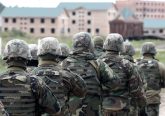
Last week saw the first convoy of trucks carrying NATO containers, which first travelled the road to Afghanistan eleven years ago, making their return journey through Pakistan. This was a sober reminder of a harsh reality: The West is finally quitting Afghanistan in spite of their failure to militarily win the war; a war that has been expensive in both human and material terms. As part of the fast-tracked drawdown of US and NATO forces from Afghanistan, the Obama administration has decided to withdraw 34,000 of the 66,000 US troops currently stationed in Afghanistan by this time next year. It is yet to announce whether, or how many, US military trainers and advisers will be stationed in Afghanistan beyond the end-2014 deadline of NATO’s military exit from the insurgency-wracked nation.
Later this year, the Afghan National Security Force (ANSF) will resume security responsibility across Afghanistan, with US-NATO forces in the subsequent period providing only back-up support for its counter-insurgency campaign. The 352,000-strong ANSF does constitute the largest security force Afghanistan has ever had in history, but many recruits are inadequately trained and its effectiveness is marred by frequent desertions. Recent increases in the so-called green-on-blue attacks means it also has a serious problem of insurgent infiltration. Given these considerations, it is doubtful that Afghanistan’s security transition will be as smooth as expected. The only way its course can become reasonably certain is if Afghanistan’s political transition makes credible headway in the months ahead.
Some promising trends are indeed visible on this front. First and foremost, there is growing cooperation between both the Afghan and Pakistani security services and their governments and signs of a genuine commitment from both sides to work to take the Afghan reconciliation process forward. They have established a contact group to coordinate mutual efforts for peace, and are now committed to the recently unveiled ‘Peace Process Roadmap to 2015’ (a peace plan proposed by the Afghan High Peace Council, the body responsible for negotiating peace with both the Taliban and other Afghan insurgent groups on behalf of the Afghan government). The third round of the British-sponsored tripartite process earlier this month has also produced a joint pledge by Afghan-Pakistan civilian leadership to secure a peace settlement with the Taliban within the next six months.
After last year’s failed bid to talk directly to the Taliban, the Obama administration appears to have subcontracted much of the international effort for reconciling Afghan insurgent leadership to the British. This makes sense, given their historical ties and more extensive experience of the Af-Pak region. The British know very well that the road to peace in Kabul passes through Islamabad. It is, therefore, unsurprising to see Pakistan suddenly assuming the role of a key broker of peace in Afghanistan (despite its alleged support to Taliban-led insurgents during the current Afghan war).
Pakistan also seems to have undertaken a calculated shift in its regional security approach. This shift is occurring essentially in response to NATO’s military exit from Afghanistan, and entails an unavoidable compromise in its past policy of realizing India-specific security interests in Afghanistan through sponsorship of religiously radicalized Afghan groups, the Mujahideen in the 80s and the Taliban afterwards. It is currently inclined to accept the establishment of an Afghan regime that includes the Taliban but is not dominated by them. Even with India, its key competitor in Afghanistan, Pakistan has shown greater willingness to intensify trade and travel links, and work to defuse some of the many tensions between the two nations, such as over the Line of Control in Kashmir.
An amicable resolution of the Afghan conflict will accrue several genuine gains for Pakistan. The consequent relative stability in Afghanistan will prevent the worsening of an already devastating security situation, and also help towards the goal of repatriating the officially estimated 1.6 million registered and 1 million unregistered Afghan refugees. Improved security in Pakistan’s western borders with Afghanistan will allow its army and paramilitary greater ability to fight domestic insurgency and terrorism, as well as manage perceived security threats from its eastern frontiers with India. Moreover, in the long run, Pakistan could realize its long-cherished trade and energy ambitions in Central Asia. The Turkmenistan-Afghanistan-Pakistan-India (TAPI) gas pipeline project in particular could help overcome its acute energy crisis.
While Pakistan’s willingness to secure a peace deal between the Afghan government and the Taliban-led insurgents is important, it is its unique ability to do so that is crucial. The Taliban still refuse to talk directly to Kabul. However, their leadership has held dialogue with the US before, sent its envoys to recent conferences in Tokyo and Paris and pledged its support for a negotiated settlement. If the Taliban agree to negotiate directly with the Afghan regime, a possibility; the realization of which rests considerably on Pakistan, then we can expect the ensuing dialogue to produce meaningful results in the months ahead— although not necessarily within the six-month deadline pronounced by Afghan-Pakistan leaders. Having said that, the process will not be free of troubles.
If Pakistan feels at some stage that its interest in securing a friendly regime is being obstructed by hardline figures in the Afghan government, then it has the lever of raising the issue of Afghan refugee repatriation to extract due concessions in the process. Pakistan would also like to have the issue of Pashtun marginalization in Afghanistan’s political and security structure to be effectively addressed. However, to keep Pakistan on the Afghan peace track, the role of Afghanistan’s regional and international stakeholders, particularly the US, will be crucial.
The goal of the Obama administration is to secure smooth withdrawal of NATO forces from Afghanistan, for which Pakistan’s help is important. Its supply route ensures cheaper and speedier reverse shipment of NATO’s non-lethal military hardware. US dependence on Pakistan for NATO shipment and Afghan reconciliation, and Pakistan’s reliance on US security and economic assistance create a valid context for cooperative relations between them ahead of NATO’s exit. Tensions over divisive issues such as the use of US drone in Pakistan’s tribal areas may erupt during this period, but will most likely be resolved through hectic diplomacy.
As for the wider region, the prospect of renewed domination of Afghanistan by the Taliban has long worried Iran, Central Asian states, China, Russia and India. So, if Pakistan also takes tangible steps for facilitating a power-sharing arrangement in Afghanistan, in which all of its ethnic and religious groups are reasonably represented, this will help end its current regional isolation and pave the way for enhanced regional interaction. However, to keep Pakistan permanently engaged in the Afghan conflict resolution effort, greater progress in the India-Pakistan peace process will be needed—even though the near-term scope of the possibility for resolution of their core issues, such as Kashmir and cross-border terrorism, is quite limited. In Afghanistan’s case, Pakistan is only upset about India’s security role there—an issue that may become irrelevant with Kabul’s growing interest in training Afghan army officials in Pakistani military academies. Indian and Pakistani economic ambitions in Afghanistan and Central Asia are quite compatible; with Pakistan accepting India’s economic role in Afghanistan and the two countries being party to TAPI.
However, as clear from preceding discussion, the story of Afghanistan still revolves around a host of ifs and buts. NATO’s military exit military from Afghanistan entails risks and opportunities both for Islamabad and Kabul, which is why we now see them cooperating more pro-actively than before to secure a peace deal with the Taliban. Outside support for the Afghan reconciliation process, especially from Pakistan, has crucial value; but, ultimately, it is the Afghans who will determine their destiny, for better or worse.
The author is the Quaid-i-Azam Fellow at St Antony’s College, University of Oxford.






No Comment